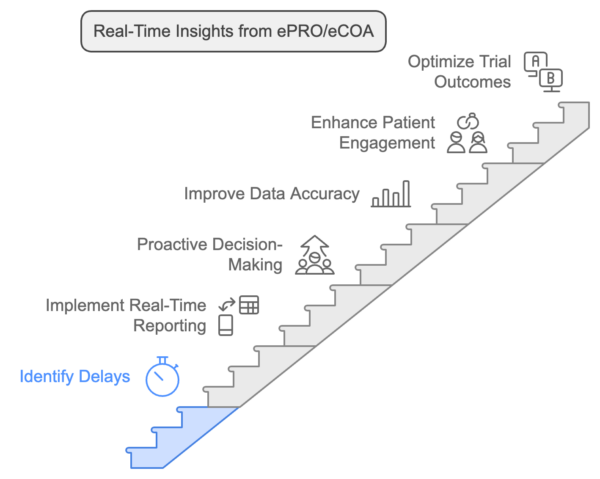Clinical trial delays cost everyone. They cost sponsors in the traditional, dollars-and-cents way. However, they also cost patients and their loved ones when they are forced to wait for life-changing therapies. For many, the wait is just too long.
In modern clinical trials, there is no longer any excuse for delays that occur between the time data is collected and the time it is available to study teams. Timely access to patient-reported outcomes (PROs) and other crucial data points is key to making informed decisions. But sponsors often encounter delays due to the slow manual collection and reporting processes used by traditional data management systems. This can lead to decision-making based on outdated information, creating risks to timelines, data accuracy, and more.
Addressing this issue, the TrialKit platform offers an ePRO and eCOA (electronic clinical outcome assessment) solution along with robust reporting and AI-driven analytics with TrialKit AI. This enables research teams to have immediate insights into study data, ensuring more proactive and data-driven decision-making.
In this blog, we explore how TrialKit’s ePRO/eCOA and reporting capabilities help overcome the challenges of data delays and keep research teams consistently informed throughout a clinical trial.
Understanding the Pain Point: Data Delays in Clinical Trials
One of the common pain points in clinical trials is the delay between data collection and reporting. Traditional methods often involve multiple steps, including manual data entry, batch uploads, and time-consuming validation processes. These delays not only slow things down but also prevent researchers from quickly responding to potential issues. This can lead to missed opportunities to adjust protocols, improve patient engagement, or identify risks early.
When researchers receive delayed information about patient outcomes they lose a critical window of time where proactive changes could make a significant impact. This is especially true for studies using decentralized data collection strategies where there is no reason to not have immediate access to data other than using outdated platforms or solutions. Real-time reporting solves this by providing a continuous and up-to-date view of study data.
TrialKit’s Real-Time Reporting: A Game Changer for ePRO/eCOA Data
TrialKit addresses this issue with its robust real-time data collection and reporting tools. As part of its ePRO and eCOA solutions, TrialKit offers a native-mobile framework, allowing for seamless integration with various mobile devices, wearables, and web applications. Whether study participants are reporting outcomes from a clinical site or remotely from home, the data is immediately captured and shared with researchers.
Here’s How TrialKit’s Reporting Stands Out:
- Instant Access to Data: The TrialKit platform ensures that the moment a participant submits their data, it’s available to researchers in real-time. This eliminates any delay caused by manual processes or overnight batch uploads. With this continuous flow of information, researchers can monitor patient progress and adherence to protocols as it happens.
- A More Complete Picture of What the Data Says: As the raw ePRO data comes in, TrialKit AI helps uncover the stories within the data fast. No matter how large a study, and how many ePROs need to be analyzed, TrialKit AI helps identify important trends and potential risks quickly.
- Proactive Decision-Making: Real-time reporting allows researchers to make proactive adjustments throughout the trial. For example, if a participant is noncompliant with a prescribed treatment protocol, immediate action can be taken to address the issue. Similarly, adverse events or unexpected reactions can be quickly flagged, enabling site staff to intervene as needed. This significantly reduces the risk of negative trial outcomes and increases the likelihood of success.
- Improved Data Accuracy: By collecting data in real-time directly from the participant, the risk of data duplication, errors, or manual entry issues is dramatically reduced. Additionally, TrialKit’s integration with wearables and other digital health tools ensures a continuous stream of objective, high-quality data taken directly from the source (the participant), reducing the need for excessive data cleaning and eliminating the need for time-consuming source data verification (SDV).
- Enhanced Patient Engagement: TrialKit’s native-mobile platform makes it easy for participants to report their outcomes from anywhere at any time. Automated notifications and reminders ensure participants stay engaged and complete their assessments promptly. This not only boosts patient retention but also leads to more accurate and timely data reporting. When participants can report their data through user-friendly interfaces like mobile apps or web portals, compliance rates improve significantly.

The Power of Real-Time ePRO and eCOA Insights for Better Trial Outcomes
Real-time ePRO reporting goes beyond simply speeding up data collection. It transforms the way researchers interact with trial data and offers new insights that were previously unavailable. With real-time electronic patient-reported outcome and electronic clinical outcome assessment data, researchers can:
- Identify Trends Early: Continuous data collection allows for easy monitoring emerging trends in patient-reported outcomes.
- Optimize Trial Protocols: Access to up-to-the-minute data enables researchers to make evidence-based decisions about trial protocol adjustments, such as changing the dosage of a medication or altering the frequency of patient check-ins.
- Streamline Regulatory Reporting: Real-time reporting also simplifies regulatory compliance by ensuring that the most current data is available for submission to oversight bodies. Sponsors can more easily meet regulatory timelines and avoid penalties or delays due to incomplete or outdated data submissions.
Conclusion
TrialKit’s ePRO/eCOA and AI-powered reporting tools provide research teams with immediate insights, enabling faster, more informed decisions and helping to prevent data delays that can derail a trial’s success. With features like automated notifications, seamless data collection, and seamless integration with the growing number of remote data collection solutions (e.g. wearables, sensors, etc.), TrialKit empowers researchers to take control of their trial data and optimize outcomes.
Contact us today to speak with one of our product experts about accessing insights from your ePRO data using TrialKit.



